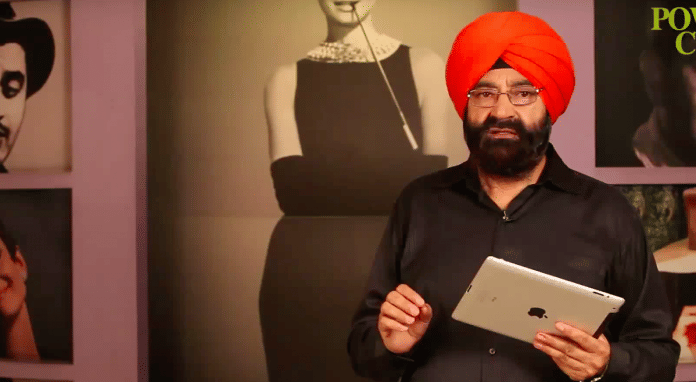In the world of Indian political satire, Jaspal Bhatti is both a legacy and a reminder — of a time when political criticism and dissent in India were possible even on state-backed networks. Nothing could escape Bhatti’s blazing scrutiny, whether it was rising onion prices, corruption in politics or the issue of burning brides.
“I have always believed that the humour of undivided Punjab has always been the sharpest, the most unexpected and good-natured or self-deprecating humour. Jaspal Bhatti for me represented that humour, which was subtle that never punched down but up, that questioned systems in power, and mindsets that rule us. He is the first guru of satire in India and he remains the biggest influence on my comedy,” said stand-up comic, lyricist and filmmaker Varun Grover.
That blend of humour and conscience defined Bhatti’s early years too.
Born on 3 March 1955, Bhatti grew up in Amritsar and studied electrical engineering at Punjab Engineering College in Chandigarh. It was here that he formed the Nonsense Club, whose skits on dowry, adulteration, corruption, and black marketing became quite popular. Its members once went to a theatre with a placard saying, ‘Buy tickets in black from here.’
“He would perform live satire at the Chandigarh Sector 17 mandi, and [as part of the skit] buy MLAs,” said political satirist Sumeet Gill.
Also read: Flop Show — Jaspal Bhatti’s 1989 satire spared no one, and the common Indian loved it
Campus skits to primetime TV
After graduating, Bhatti joined The Tribune as a cartoonist in 1983. His drawings focused on social and political issues of the day, and used satire to poke fun at politicians. He moved to the electronic medium and created his first television show — Rang Vich Bhang for Jalandhar TV.
But it was the Punjabi skit Rang Chipang, part of Chitrahaar, that played cupid for Bhatti and his future wife Savita. Savita was impressed by Bhatti’s work. The duo tied the knot in 1985, with Savita continuing her education after marriage.
Their home in Chandigarh became their office too, where Savita wrote scripts for his skits while he conducted rehearsals. Soon, the two became a power couple on Doordarshan, with series like Ulta Pulta (1986), Flop Show (1989), Nonsense Private Limited (1995), Full Tension (1995), and Jijaji (2005). Savita not only produced Flop Show but also starred in it as his wife Preeti. The show was a breakthrough in actor Vivek Shauq’s TV career too.
“Jaspal Bhatti and his team laid the groundwork for how to do comedy, which is socially conscious but extremely hilarious, and be enjoyed by an entire family. There was an episode on PHP candidates, and I saw it as a kid. It was enlightening and funny to me even at that age,” said Grover, calling Bhatti a precursor to sitcoms in India.
Ulta Pulta was a series of monologues modelled after public announcements, delivered in Hindi by Jaspal against a monochromatic background, followed by short scenes illustrating everyday absurdities. The satirical sketch show was a scathing critique of corruption.
From politicians and doctors to shopkeepers and in-laws, no one escaped his commentary.
Flop Show had ten half-hour episodes, with Bhatti as the protagonist, playing a new character each week. He floated mock political parties — Hawala Party, Suitcase Party — that lampooned the power elite.
Every episode would begin with Bhatti delivering a deadpan dedication to the topic at hand, and end with a parody of a Hindi film song. The credits were deliberately spoofy — ‘Camera Jerks’, ‘Jarring Music’, ‘Overacting’, ‘Misdirection’.
He also launched a 52-episode comedy series titled Thank You Jijaji on SAB TV. It was shot at MAD Arts, the film school Bhatti founded in Chandigarh.
Also read: A unique way to remember Jaspal Bhatti, India’s foremost humourist & satirist
Bhatti’s satire in the age of dissent
Bhatti acted in several Bollywood films — Aa Ab Laut Chalen (1999), Koi Mere Dil Se Poochhe (2002) and Fanaa (2006). But his roles were reduced to the Sikh caricatures that Hindi cinema continues to reproduce even today.
Bhatti’s first film, the Punjabi-language Mahaul Theek Hai, was released in 1999. It was a sharp satire on police corruption in Punjab, especially the heavy-handed tactics of KPS Gill during the militancy years. The film was a blockbuster, running for 13 straight weeks in Punjab theatres. The state police association even sought a ban for “maligning” the force, but it never materialised.
“The subject of the film was universal, for who in Punjab, or for that matter in India, hasn’t had a brush with police’s autocratic ways. The audiences could instantaneously empathise with the theme,” said Bhatti in an interview.
He continued to stage satire in public spaces as well. At a 2009 carnival in Chandigarh, Bhatti set up a stall displaying vegetables, dal, and oil, inviting passersby to toss rings around them, poking fun at the government’s failure to control rising prices.
Bhatti died in a road accident on 25 October 2012 at 57, a day before the release of his second feature Power Cut, starring his son Jasraj. He was posthumously awarded the Padma Bhushan in 2013.
“One sad realisation is that if he tried to recreate his own material or shows today, he would be labelled anti-national. He was performing in a time when [both] the regime and the people held space for criticism. Today, there is no space for criticism in comedy, cinema or any other medium. It is the bhaktikal of media, and you have to love everything that is powerful, rich and glossy,” said Grover.
(Edited by Prashant)






